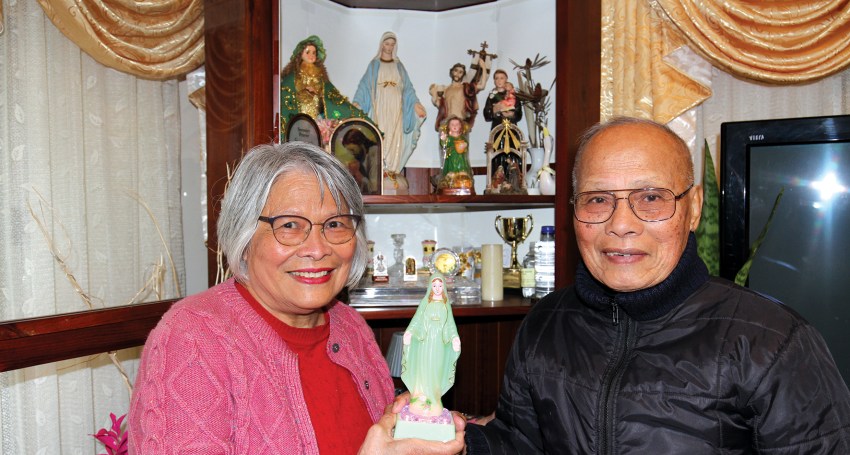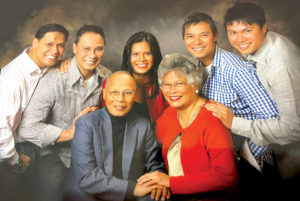Unwavering faith guides Filipino migrants
People
As Catholics prepare to celebrate Migrant and Refugee Sunday on September 26, Francisco and Rosalinda Lacar speak about their decision to leave the Philippines and migrate to Australia with their five children in 1987.

Not long after arriving in Adelaide as an immigrant, Francisco Lacar wrote a poem about being homesick.
‘If only I had wings I could fly back to the Philippines,’ he wrote.
The father of five had been here for two years trying to find work in the banking industry, ever conscious of the need to provide for his children who ranged in age from 7 to 17.
Despite holding a senior position with a major bank in the Philippines, and undertaking additional training in Australia, Francisco was unable to find work in this field. Similarly, his wife Rosalinda, an assistant principal in a Catholic school back home, was having no luck with employment.
Advertisement
It was a difficult decision to leave his home city of Ilocos Norte in northern Philippines but life was becoming increasingly unstable after martial law was imposed by the Marcos regime. His sister Juanita was already in Adelaide and convinced him Australia was a good place to raise a family.
With mouths to feed and school fees to pay, Francisco took a job working ‘back of house’ at the Hyatt Regency, and he remained there until he retired 19 years later. Rosalinda joined him in the laundry department at the hotel, realising that she would never find a teaching position in metropolitan Adelaide.
“It wasn’t the best, not what we really wanted,” 77-year-old Rosalinda said.
The couple’s strong Catholic faith helped them in those early years. One of the first things they did when arriving in Adelaide was to find a church. Their other priority was to educate their children in Catholic schools. The boys were enrolled at Blackfriars Priory College and the youngest went to Rosary School and then St Dominic’s Priory College.
In the Philippines the Lacars had been actively involved in the local parish. Francisco was raised in a devout Catholic family of eight children and his father was the local parish secretary and administration assistant for 52 years. One of his brothers became a priest, as did his nephew, and he and Rosalinda were part of the basic ecclesial community movement, which involved conducting seminars, visiting prisons and helping the poor.
“Our family has a strong Catholic background,” said Francisco, 82. “It’s funny to say but I was not yet born and I was already Catholic, my forefathers were all Catholic.”
When they came here and rented a house in Prospect, the family started attending Rosary Church and joined the prayer group.
“That helped us in our adjustment, the parishioners were very helpful and always came around to visit us in the house we were renting,” Rosalinda said.

Francisco and Rosalinda with their children, from left, Francisco Jnr, Franklin, Frances, Froilan and Freddie.
After moving to Blair Athol, they joined the Kilburn parish and in 1989 Francisco and Rosalinda started their own prayer group which is still going today.
Called the Holy Trinity Prayer Group, it comprises about 12 to 15 couples who meet in each other’s homes for scripture readings and prayer.
Francisco was a Eucharistic minister for many years and helped with the gardening before his knees started giving him trouble.
He and Rosalinda participate in Mass several times during the week as well as on Sundays and they pray the rosary every night.
Advertisement
“We can’t go to sleep without praying,” Francisco said.
When the youngest of their seven grandchildren come over for dinner, Rosalinda asks one of them to lead prayer before dinner and there is often an argument over who will light the candle.
Three of their children live in Adelaide (two working in the wine industry and one as project manager in the SA Infrastructure Department), one son is in Canberra working for the Australian Crime Commission and their youngest child, Frances, is in Perth, where she was recruited by the mining industry as a business analyst.
Rosalinda said the challenges she and Francisco experienced motivated them to study hard.
“I think it’s really very providential that we came to Australia,” she said.
“If I ask my kids now they would say ‘mum if we did not come here and experience a hard life we would not appreciate it’.”
In addition to his faith, poetry has been a comfort to Francisco and a way of expressing his strong feelings on politics and religion as well as his thoughts on everyday life.
“When I have the mood, even at dawn time, I wake up and just scribble what I have in mind and then leave it and go to sleep again,” he said.
“And then after some time I go back and review it again.”
While most of his poems are written in his local language, Ilocano, he also writes in English. His poems have been included in books and anthologies circulated in the Philippines, Hawaii and the United States and in newspapers and magazines such as Timpuyog Journal, the Philippine Community Herald (published in Sydney) and Bannawag.
His current passion is writing about life issues such as euthanasia and abortion, one of which his sister Juanita forwarded to The Southern Cross during the recent Parliamentary debate on Voluntary Assisted Dying laws.
Francisco said he wrote to his local MP Andrea Michaels expressing his concern about the VAD bill and he was pleased to get a response saying she voted against it. But he said he was “saddened” to see the legislation passed.
“It affects me a lot … that’s why I wrote the poem,” he said.
SAFEGUARD THE DIGNITY OF HUMAN LIFE
While we endure COVID-19 in this troubled world
Other stronger pandemics lurk around us
Raging wild in the midst
Of spiritual and moral degradation,
Spreading like wildfire all over Australia.
A wave of death bizarrely rampaging,
There is no stopping this conflagration.
And as Government at all levels craft legislation
Under the guise of compassion,
Innocent lives are lost, God’s gift of life desecrated
And millions of unborn babies all over the country perish
Year by year, the consequences are dreadful.
This pandemic tragically called Abortion
Is a premeditated and deliberate killing
Of helpless human beings which science
Simply refers to as a method of birth control.
This pandemic is marching on
While another pandemic is spreading with force.
Euthanasia, gaining ground in a fast cadence before our eyes,
In this our beloved State of South Australia,
Following the steps of Victoria, Western Australia and Tasmania
With Queensland following close.
Quo vadis, my beloved country, quo vadis?
Under the guise of voluntary assisted dying,
How can we be reckless about human life,
God’s sacred gift to each of us.
The consequences of this subtle and crafty act of suicide,
The impending enactment of the law
Violates the sixth of the Ten Commandments:
Thou shalt not kill.
This confused world has forgotten the Divine Law.
But there is still a chance to reverse these wicked decisions
Better late than never – repent and abolish the laws
That are in contravention of the divine law
Of the Catholic faith, moral values and traditions
Planted in this great continent by our pilgrim forefathers.








Comments
Show comments Hide comments